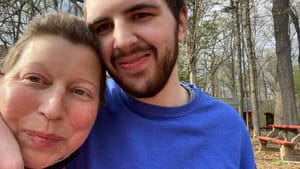Stay in the Loop
BSR publishes on a weekly schedule, with an email newsletter every Wednesday and Thursday morning. There’s no paywall, and subscribing is always free.
What I’m learning about parenting, disability rights, and myself
One year later, I’m still speaking up about pandemic narratives that ignore disability

Fourteen months ago, in mid-March 2020, I shared my perspective on the burgeoning pandemic as a mom who is a cancer survivor living with chronic illness and parenting a teen with autism and an intellectual disability. While I was writing that essay, other parents in my community were raging about schools closing down, shaming people on social media for falling for the coronavirus “hype.”
Because of my family’s needs, I took the virus very seriously from the start. Rereading my words from last year, I am filled with gratitude that my family has been able to stay safe from Covid—and I know how fortunate my husband and I are to have been able to work from home this past year. As we glimpse a return to places and experiences that we have missed over this 14-month period, I am keenly aware of how living through the pandemic has unveiled hidden parts of myself and affirmed my diligence as an advocate and ally on behalf of my son, George, and others with intellectual disabilities.
Unexpected advantages
“We do things that we can enjoy together close to home—like cooking and taking nature hikes with our dog—and that’s an advantage right now,” I wrote last year about how my family was more prepared than many others for pandemic life, because of my son’s autism. I had no idea that we would need to be primarily home-based for such a long time.
As hard as it was to initially adjust to my son’s low-sensory needs when he was a young child, it helped us to create family routines based on nature walks, tending our garden, and seeing friends primarily outdoors (the smells and visual stimuli in friends’ homes could be dysregulating for my son). I would never have imagined how our lifestyle became an unexpected advantage, meaning that I could slide into pandemic life much more easily than most of my peers. I wasn’t experiencing as much social loss as others around me were.
While I thought that our relaxed lifestyle was primarily to benefit my son, I had no idea how much more comfortable, happy, and centered I could feel as a result of going fewer places and experiencing less outer stimuli. I have reestablished a daily yoga practice that’s making me feel strong, physically and emotionally. I’ve read more than I have since becoming a mom. I’ve enjoyed the intimate walks I’ve taken with friends so much more than meeting a group of people for dinner. I am thrilled to be vaccinated and safe to go places again, but I am doing so with a new intentionality and non-urgency to see and do the latest thing. It’s liberating.
Same storm, different boats
Those are some of the upsides to my pandemic life. But I’ve also been more keenly aware than ever that if you are not disabled yourself, or living with a disabled loved one, you could easily have no idea of what life is like for disabled people. Every time I opened a major media outlet to read about parental burnout, pandemic fatigue, or overwhelm, the stories were about parents of neurotypical children. Stories about parenting and disability in the pandemic were few and far between.
I appreciate the metaphor that says while we have all been in the same pandemic storm, we’ve been on vastly different boats. Besides balancing work and kids’ education, parents of kids with disabilities have faced losing essential at-home therapies and services for their children—something that no one was prepared for.
We were extremely fortunate that George was able to attend school in person about 75 percent of the year. Online instruction simply doesn’t work for him. But many families were not so lucky—and have spent the better part of the year attempting to get the educational services that are mandated by law for disabled students; in many cases, families are now fighting for compensatory services for what their children didn’t receive during the year. For many young people with disabilities, regression in terms of life skills learned in school means a significant increase in support needs, during a time in which support workers in the home weren’t always possible.
Happening here and now
But perhaps most frightening, I read with horror about cases in which medical professionals were devaluing the lives of people with intellectual disabilities in favor of treating nondisabled people. I am the granddaughter of a refugee from Germany during the Holocaust and have spent most of my life attempting to comprehend the rise of the Nazis and the implementation of their murderous plans—which began with the killing of disabled people. When a society starts to ration medical care based on intellectual ability as a measure of who is worthy of living, it’s a sign of alarm. It shakes me to the core to learn that this could happen, here and now, to people with intellectual disabilities.
And so here we are in this beautiful spring, a little more than one year later. While I am thankful that my family has weathered the pandemic relatively well, I am distressed by what these 14 months have revealed about how our society devalues people with intellectual disabilities. And how few people are paying attention.
Image description: A selfie of Gabrielle Kaplan-Mayer and her 18-year-old son, George. They are outside with trees behind them, leaning their heads affectionately together.
Sign up for our newsletter
All of the week's new articles, all in one place. Sign up for the free weekly BSR newsletters, and don't miss a conversation.

 Gabrielle Kaplan-Mayer
Gabrielle Kaplan-Mayer